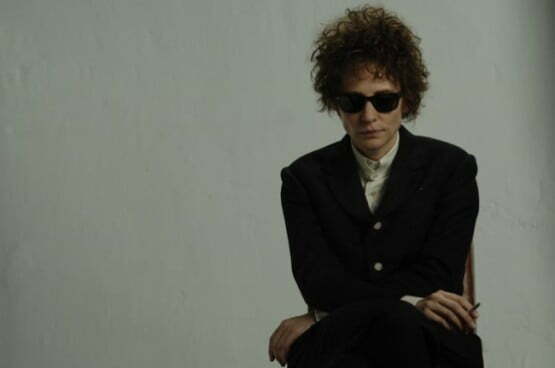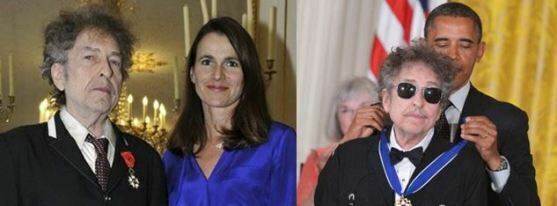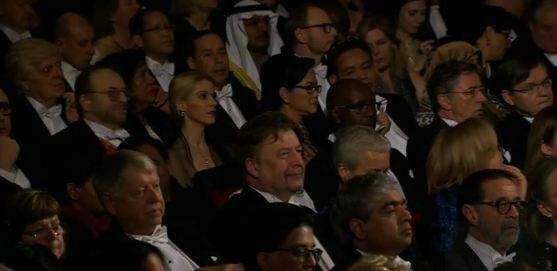
‘I’m Not There‘ is the title of one of Bob Dylan’s most remarkable songs, mysterious in word and tune. It was recorded as part of his ‘Basement Tapes‘ sessions with The Band in 1967, but not released when the Basement Tapes album was published in 1975, presumably because of the unfinished state of the recording. It passed into legend as the greatest Dylan song you had never heard (unless you were a connoisseur of bootlegs). It emerged into public consciousness with Todd Haynes’ 2007 film I’m Not There, a sort of biopic in which different actors (Richard Gere, Christian Bale, Cate Blanchett etc) play Dylan at different states of his career. The title perfectly summed up the mystery of the man whose portrait could not be painted. It is also the ideal title for the saga of Dylan’s acceptance of the Nobel Prize for Literature.

Like all good people. I rejoiced at the news in October that Bob Dylan had been awarded a Nobel Prize, “for having created new poetic expressions within the great American song tradition”. Yes, there was a little bit of discussion about whether a popular musician was suitable for such an award, and whether what Dylan wrote qualified as poetry, but mostly people recognised that the award was timely. As Professor Horace Engdahl said in his presentation speech at the ceremony yesterday, it was “a decision that seemed daring only beforehand and already seems obvious”. Having been an outside bet for the award for years now, Dylan was finally being recognised for what he had done for the word in our times.

And then the fun began. Anyone who has followed Dylan over the years will know that he does his own thing, and that that thing can conflict with what seems logical, or courteous. From his earliest days as a performer, such as the notorious time in 1963 when he used the occasion of the Emergency Civil Liberties Committee awarding him its annual Tom Paine Award to say that he understood what Lee Harvey Oswald might have been thinking, Dylan has not seen ceremony the same way as the majority. It’s something about not accepting norms as necessarily being truths. As with any artist of note who has reached a certain age, he has had his fair share of medals offered to him, and he has turned up to collect his Legion d’Honneur and Presidential Medal of Freedom, while looking acutely awkward on both occasions.
So, the normal thing to do on being told that you had been awarded a Nobel Prize would be to express shock and delight to the media, to thank those who had bestowed the award, then to turn up on the day, armed with a speech designed to say something profound about literary significance. Dylan, naturally, did none of these things. He did not initially acknowledge the award at all, instead playing a show at Las Vegas that evening. It was not reported on his website (a brief notice was there for a short while, only to be removed). Dylan’s snub to the no doubt embarrassed Nobel committee became a news story in itself. Would he turn down the award? What was he thinking? Eventually Dylan acknowledged the award, expressing a rather touching sense of awe at such an honour, and saying that he would be there at the ceremony if he could.

And then he couldn’t come after all. Who can say why. He didn’t have a concert planned for the date, but Dylan only offers us mystery, with each version of him that we see turning out in the end to be the Dylan who is not there. My personal theory is that he saw what the dress code was for a Nobel Prize award ceremony, and decided that he just wasn’t going to fit in, but maybe it was just plain nervousness.
Instead we got Patti Smith, who happened to be there in any case for a Nobel Week speaking event. She wouldn’t collect the prize on his behalf, but she would sing one of his songs, a manifestation of Dylan much the same as Cate Blanchett became a manifestation of Dylan in the film. I watched the ceremony streamed live on YouTube (along with around 3,000 others, so YouTube informed me). We saw the great and the good of the Nobel world dressed in their finery; heard the opening address by Professor Carl-Henrik Heldin, Chairman of the Board of the Nobel Foundation, warning us of the threats to truth in the world today; saw the worthy laureates for physics, chemistry and medicine receive their prizes; and heard short classical musical interludes.
The 2016 Nobel Prize Award Ceremony at Stockholm Concert Hall, 10 December 2016. Patti Smith’s rendition of ‘A Hard Rain’s Gonna Fall’ is at 1:03:00
All this greatness was duly upstaged by the man who was not there. The literature prize was introduced by a striking speech from Horace Engdahl (given in Swedish but translated live into English) on why Bob Dylan had been given the award. The speech was arch and a tad too pleased with its cleverness, but nevertheless gave genuine insight into Dylan’s contribution to literature:
His rhyming is an alchemical substance that dissolves contexts to create new ones, scarcely containable by the human brain. It was a shock. With the public expecting poppy folk songs, there stood a young man with a guitar, fusing the languages of the street and the bible into a compound that would have made the end of the world seem a superfluous replay. At the same time, he sang of love with a power of conviction everyone wants to own. All of a sudden, much of the bookish poetry in our world felt anaemic, and the routine song lyrics his colleagues continued to write were like old-fashioned gunpowder following the invention of dynamite.
(Of course the mention of dynamite is a sly reference to the notorious invention of Alfred Nobel, the profits from which helped give us the Nobel prizes.)
With the ending of the speech, the man who was not there received a standing ovation. In his place, Patti Smith sang ‘A Hard Rain’s Gonna Fall’, first recorded for Dylan’s Freewheelin’ album in 1963. She sang amid an orchestra, initially accompanied only by an acoustic guitar and pedal steel, before the strings came in. Awfully, though, she forgot the words about a quarter of the way through and had to start again, pleading nervousness. She nearly forgot them a second time, but happily recovered, leaving us to wonder when her discomfort was on account of nerves, thoughts on the enormity of the song’s significance, or simply the effects of age (it’s a long song, and Dylan has spoken of his reluctance to sing some of his old songs because there are too many words for him now to remember). What irony that the final verse ends with the words “But I’ll know my song well before I start singin'”.

It was a profoundly moving performance that Smith gave in the end, as Dylan’s words of a metaphorical apocalypse struck home with an audience aware that their world was under threat, and that they understood what the consequences of that might be. Heldin said these words in his opening address:
… just as in the era of Alfred Nobel, today there are dark clouds in the sky around the world. Terrorist acts are a part of many people’s daily lives, and wars are under way in many places. International cooperation, cross-border movements and openness are being criticised. Science and knowledge are being questioned, the climate issue being one recent example. Leading politicians − both in Europe and the United States – are winning votes by denying knowledge and scientific truths. Populism is widespread and is reaping major political successes. The grim truth is that we can no longer take it for granted that people believe in science, facts and knowledge.
If you wanted a picture of an elite you could do no better than the 1,500 people gathered in the Stockholm Concert Hall for the Nobel Prize ceremony. Here was privilege combined with understanding, a civilised world built on science, rationality, humanism – and dynamite. It is a world under threat because the rational is just one kind of story, and today those who cling to other kinds of stories are in the ascendant. They are losing the narrative, and with it power. They will need to find again stories that enough people can believe in, or else a hard rain is undoubtedly gonna fall.
Dylan did at least write an acceptance speech, which was delivered at a banquet later in the day by United States Ambassador to Sweden Azita Raji. It doesn’t say profound things about the power of the word or the state of the world today. Instead it expresses Dylan’s delight and surprise at the honour, and tries to say something about how the writer works:
I was out on the road when I received this surprising news, and it took me more than a few minutes to properly process it. I began to think about William Shakespeare, the great literary figure. I would reckon he thought of himself as a dramatist. The thought that he was writing literature couldn’t have entered his head. His words were written for the stage. Meant to be spoken not read. When he was writing Hamlet, I’m sure he was thinking about a lot of different things: “Who’re the right actors for these roles?” “How should this be staged?” “Do I really want to set this in Denmark?” His creative vision and ambitions were no doubt at the forefront of his mind, but there were also more mundane matters to consider and deal with. “Is the financing in place?” “Are there enough good seats for my patrons?” “Where am I going to get a human skull?” I would bet that the farthest thing from Shakespeare’s mind was the question “Is this literature?” …
But, like Shakespeare, I too am often occupied with the pursuit of my creative endeavors and dealing with all aspects of life’s mundane matters. “Who are the best musicians for these songs?” “Am I recording in the right studio?” “Is this song in the right key?” Some things never change, even in 400 years.
Not once have I ever had the time to ask myself, “Are my songs literature?”
You sense that Dylan is still trying to work out the meaning of the acclaim that his work has received, and the awards that follow such acclaim. What is literature anyway? It is something upon which the great and the good pronounce, from time to time. Such truths have been held to be self-evident. But today such belief is under threat. Maybe Dylan was likewise querying our ceremonies and assumptions when he reacted so strangely to the news of the award. Maybe there’s still something in him of the young man who didn’t see the Tom Paine award in the way that those bestowing it did. Maybe he was just overwhelmed. More likely he’d want you not to be looking at him but to listen to the songs, and make up your own mind.
Oh, what did you see, my blue-eyed son?
Oh, what did you see, my darling young one?
I saw a newborn baby with wild wolves all around it
I saw a highway of diamonds with nobody on it
I saw a black branch with blood that kept drippin’
I saw a room full of men with their hammers a-bleedin’
I saw a white ladder all covered with water
I saw ten thousand talkers whose tongues were all broken
I saw guns and sharp swords in the hands of young children
And it’s a hard, and it’s a hard, it’s a hard, it’s a hard
And it’s a hard rain’s a-gonna fall
Links:
- The Nobel Foundation website provides the text of the opening address by Carl-Henrik Heldin, the introduction to Dylan’s award by Horace Engdahl, Dylan’s acceptance speech (by proxy), the banquet menu and much more besides
- The Nobel Foundation’s bio-bibliography of Bob Dylan is a fascinating document for how it presents his output from a literary perspective, starting off with a surprising bibliography
- The texts of Dylan’s acceptance speech for the Tom Paine award in 1963, and his extraordinary letter of explanation that followed the controversy (“for no one can say what I meant t say / absolutely no one / at times I even cant”), are on the Letters of Note site
- Here’s Bob Dylan in 1963
- And here he is in 1967, or 2007, or wherever
This has to be among the greatest of all the ‘Hitler’ videos produced, eerily prophetic in its ending (which is well worth looking out for):